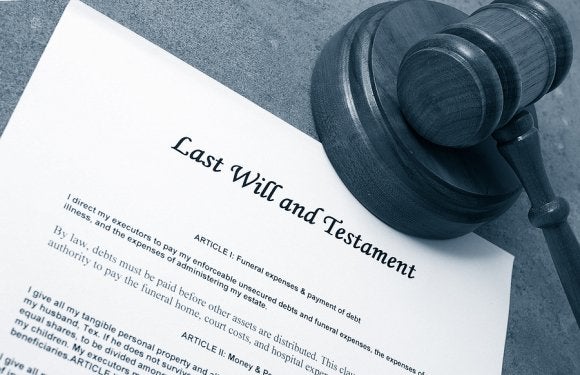-
How Are Heirs Determined in Texas?
When a family member passes away, the surviving relatives must turn to a will or a probate court to determine how the deceased’s property should be distributed. To receive property, in the absence of a will, Texas probate law requires that you prove that you are a legitimate heir. To go through this process, it is often helpful to hire a probate lawyer in The Woodlands to assist with your case. Here is what you need to know about establishing yourself as an heir under Texas probate law.
Wills

A will is the most straightforward way to determine who is a legitimate heir. If there is a will in place, and no one contests it, then the will should state very clearly who the deceased intended to be an heir to his or her estate. If someone is not named as an heir in the will, then it is not possible to prove in court that he or she has a legitimate claim on being an heir without challenging the will. Challenging the will means proving that there is a legal reason it should not be considered binding.
Heirship Applications
If there is no will in place, then the estate will be decided in probate, and everyone who believes he or she should be considered an heir must file an application. Before heirship applications can be accepted, the potential heirs must establish that the deceased died without a complete will and that he or she had property in the state of Texas. There must also have been no administration of the estate, or, in cases where there was will, property must have been left out of the will. If these requirements are met, the applications for heirship can be submitted in a county in which the deceased owned property. The applications request information about the potential heirs and their relationships with the deceased. All potential heirs must sign the application, and if there are heirs that cannot be located, an ad must be placed in the paper to attempt to locate them. The court then uses this information to determine how to allocate the estate appropriately.
-
Hiring a Family Law Attorney
If you are in the market for a family lawyer in The Woodlands, then you may be wondering what to look for in a family law attorney. As with any other attorney, the most important thing is to feel comfortable with the person whom you choose.
When you hire a family law attorney, it’s important to insure that he or she has significant experience in family law practice. An experienced family lawyer can represent you no matter how complicated your case may turn out. He or she should know the state family law statutes and case law, as well as local courtroom procedures. A prospective attorney will also likely have handled many similar cases in the past and can advise you of possible outcomes.
For a family law attorney in Conroe, TX, look no further than the office of Andrew J. Bolton, Esq. With nearly 25 years legal experience, Andrew J. Bolton is dedicated to protecting your assets and doing what is best in your family law matter. Call us at (936) 435-1908 to get started.
-
How to File for Divorce
The first step in filing for divorce should be to consult a family attorney in Spring, TX. A divorce lawyer will review your situation and discuss all applicable issues with you, such as child custody, property division, and child support. When you’re ready to move forward with the petition, your divorce lawyer will prepare and file a petition with the court on your behalf. Thereafter, your soon-to-be ex-spouse will be served with the divorce papers.
For more information about family law, watch this video and talk to your child custody lawyer. This brief introduction to divorce petitions explains that both spouses may be required to submit financial affidavits and supporting documents to the court. You’ll also learn about some of the temporary orders the court may issue while the divorce is pending.
-
Why You Need an Adoption Attorney
You already know that you’ll need the help of a family attorney in Conroe, TX, if you’re planning a divorce or seeking child custody. But did you know that family law attorneys can also assist families who wish to adopt ? Adoption involves much more than opening your home and heart to a child in need. It’s also a legal process that requires the expertise of a family law attorney. When you consult an attorney about adoption, he or she can inform you of all applicable laws and regulations. Your family attorney can also provide a basic overview of the adoption process and what you can expect from each step.
Family law attorneys may recommend local adoption agencies and help you understand the different types of adoption. You can rely on your attorney to thoroughly prepare you for any court hearings you may attend and to represent your family in court. Sometimes legal complications arise, such as if the birth parents have a change of heart about giving up the child for adoption. If there are any unexpected bumps in the road, then your attorney will be there to help you.

-
Understanding Child Support
A child support lawyer should help you explore all aspects of family law in The Woodlands that apply to your particular situation. For example, your family law attorney can help you seek child custody and, once you are established as the custodial parent , your family law attorney can further help you petition for child support payments. Child support is based on the idea that both of the child’s biological parents are financially responsible for meeting the child’s needs. Indeed, the obligation to support your children is found in the Texas Constitution. Child support is intended to go toward the cost of the child’s housing, education, medical care, food, and other necessities.
When you watch this video, you will learn more about the basics of child support and family law. This expert explains that child support guidelines vary from state to state. Wisely, he ultimately urges viewers to get in touch with a family attorney for case-specific guidance.
-
Factors that May Influence Your Child Custody Case
Generally, it is preferable that both parents work together to develop a mutually agreeable plan of conservatorship or custody. This collaborative approach, which minimizes conflict, may be facilitated by a family law attorney . Nevertheless, when parents cannot come to an agreement, the court will establish child custody arrangements. As your divorce lawyer serving The Woodlands can advise you, the judge will make a decision based on what he or she feels is in the child’s best interests. In some cases, one parent may have significant problems such as a history of child neglect or drug abuse. Such issues can prompt a judge to grant custody to the other parent. However, in many cases, there are other subtle factors, such as the stability of the family home, which may also have a large influence on the judge’s decision.

Residency
Some family law experts suggest that judges are often influenced by the residency of each parent. This means that child custody may be more likely to be granted to the parent who will continue living in the family home. Similarly, a parent who has obtained custody of the minor children may be more likely to be awarded the family home in connection with a divorce. Attorneys will generally advise clients not to move out of the family home if custody will be at issue. However, if you have moved out of the family home, your family law attorney may advise you to arrange for permanent housing as quickly as possible, to demonstrate stability. Arranging for permanent housing in close proximity to the children’s schools, whenever possible, is ideal.
Cooperation
In family court, allegations made by the parents are often of a “he said, she said” nature. To substantiate your case, your family attorney may offer evidence that you have a history of cooperating with the other parent or that the other parent has a history of non-cooperation, or even a history of using derogatory language about you in front of the child. Oftentimes, a family court judge might award child custody to the parent who is most likely to cooperate with the other parent and who tries to preserve the child’s relationship with the other parent.
Stability
All children need stability and continuity for their healthy socio-emotional development. Since a divorce significantly changes a child’s life, the judges try to minimize its effects as much as possible. If one parent has been primarily caring for the children while the divorce case was pending, that parent may be more likely to be awarded custody. If you see a divorce coming, it is wise to establish yourself as the child’s primary caregiver in the months leading up to the filing.
-
The Basics of Filing for Child Custody
When it’s time to end a relationship with the other parent, determining child custody is a significant concern. Your first step in filing for custody is to contact a child custody lawyer serving Spring, TX. Such family law attorneys will have an in-depth knowledge of child custody proceedings. He or she will ensure that the forms are filled out properly and filed with the appropriate court to prevent unnecessary delays in your case. A child custody attorney will also guide you through the mediation process, which is often mandatory.
To hear more about working with a family law attorney, watch this brief video. This expert explains that family law varies from state to state. He also urges viewers to get in touch with an attorney for personalized legal guidance.
-
Answers to Questions About Divorce in Texas
The disputed divorce is often challenging, particularly because both parties must disclose their personal information, deal with the division of property, and reach an agreement regarding child custody arrangements. A divorce attorney near Spring, TX, can help make this divorce process easier, giving you all the information you need and walking you through the proceedings, step-by-step. Your divorce lawyer can also answer any questions you may have about Texas family law.

Are There Any Residency Requirements?
Yes, Texas family law requires that one or both spouses be a resident for at least six months. Additionally, the party who files the divorce petition must be a resident of the county in which the paperwork is filed for a minimum of 90 days.What Are the Grounds to File for Divorce?
Texas is a no fault divorce state. This means that it is not necessary to prove that either party is responsible for the breakdown of the marriage. When your divorce lawyer prepares the paperwork, he or she can cite “irreconcilable differences.” However, Texas law does allow divorce on fault-based grounds. Let your family attorney know if you may be eligible to file for a fault-based divorce based on adultery, conviction of a felony, cruelty, or abandonment. Other grounds for divorce in Texas include confinement in a mental hospital and separate residency for at least three years.How Long Will the Process Take?
This can vary widely, depending on the complexity of your case, and whether you and the other party can come to a mutual agreement. Once the divorce petition is filed, you must wait at least 60 days for the divorce to be finalized. If there are disputes regarding child custody, support, property division, liability distribution, or other issues, the process can take longer.Is a Divorce Trial Necessary?
In many cases, both parties appear in court and a judge makes the final decisions regarding the matters of dispute. However, it is possible to reach an amicable divorce agreement. You and your spouse can meet in mediation to reach agreements on property, custody, and other matters. Working with a divorce lawyer can help facilitate the mediation process. -
Instances When Probate Litigation May Be Required
After a death, matters pertaining to the decedent’s debts and assets are resolved through the probate process. In many cases, probate is straightforward and is easily settled. However, sometimes probate litigation may be necessary to resolve claims. It’s always a good idea to retain the services of a lawyer when dealing with probate court in Conroe, TX. A probate lawyer can help you in the event that probate litigation is needed, such as if you believe it necessary to authenticate a will. Your lawyer might contest a will if you believe that the document was not drafted properly or the signature may not be valid.
It’s not uncommon for the terms of a decedent’s will to become a source of disagreement among the heirs. You’ll need the services of a skilled probate attorney in the event that you need to dispute the will or if another heir has disputed the will. Another reason why probate litigation may be necessary is if a loved one dies intestate (without a last will and testament). In these cases, an attorney can facilitate the process of determining the rightful heirs.

-
What to Expect During an Evidentiary Hearing in Your Child Custody Case
When you hire a child custody attorney near Spring, TX, he or she will advise you of what to expect from all stages of the legal process. If you and the other parent cannot come to an agreement regarding child custody , then you may need to attend an evidentiary hearing. During this hearing, your family law attorney will represent you. Nevertheless, you and the other parent will have to testify under oath. While you are under oath, the other parent’s family law attorney will ask you questions, which you are required by law to answer truthfully. Just remember, in a court proceeding, if you do not remember something or do not know the answer to a question, you should say so.
To hear more about the role of the evidentiary hearing in family law, watch this video and consult your child custody lawyer. This expert discusses which other individuals may be questioned under oath at the hearing, such as a minor child. Additionally, certain experts may be called to testify.
RECENT POSTS
categories
- Uncategorized
- Estate Planning
- Probate
- Family Law
- Drafting a Will
- Divorce Lawyer
- Texas Family Law
- Divorce
- Real Estate
- Probate Court
- Child Custody
- Andrew J. Bolton
- Esq.
- Adoption
- Law Office of Andrew J. Bolton
- Wills
- Executor
- Infographic
- Guardianship
- Trusts
- Contested Divorce
- Child Support
- Attorney
- Living Wills
- Contested Will
- Prenuptial
- Probate Bond
- Heir Apparent
- Legacy Contact
- Living Trusts
- legal guardian
- Legal Disputes
- property rules
- Common Law
- Stocks
- Estate Tax
